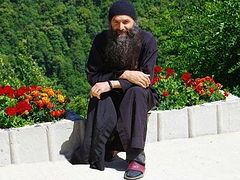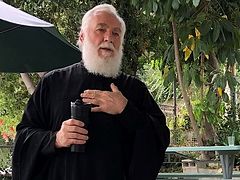Alexander Borisovich Torik (September 25, 1958, Moscow) is an archpriest, writer, and author of several books highly appreciated by readers. Currently, he is professionally engaged in literary work.
—The providence of God is at work in the life of every man, but sometimes it is hidden, and sometimes it clearly reveals itself in some kind of signs, significant meetings, in timely words. Dear Fr. Alexander, please share with us whether there have been such signs and clear manifestations of the providence of God in your life.
—There have been a lot of things, a lot of signs—both clear and not so much. I’ve put a lot of this in my books, sometimes almost in documentary detail, sometimes like an impulse for some artistic image. But offhand, I recall my talks with the ever-memorable Fr. Philadelph, who reposed in the schema with the name Moses at Holy Trinity-St. Sergius Lavra.
In the early 1980s, my wife and I had a spiritual father in the Lavra, in Zagorsk (now Sergiev Posad), who we regularly went to for confession and spiritual counsel. He heard confessions like other spiritual fathers in the gallery in the gate Church of St. John the Forerunner.
Fr. Philadelph carried out his obedience there at the candle desk. He was a very charismatic-looking batiushka, who would sell candles at the beginning of confession, and then, during confession, heard by various fathers at the analogions set up across the gallery, would read an akathist aloud in his characteristic sharp, loud, slightly “croaking” voice. He read very penetratingly, prayerfully, and clearly from the depths of his soul.
His tall, hunched figured reminded me of St. Seraphim of Sarov. Before entering the monastery, Fr. Philadelph was an outstanding scholar, a doctor of technical sciences, a professor (physics and mathematics, I think) in one of the famous Moscow universities. There’s a lot of information about it online; anyone who wants to can read about it (and watch the film) if you search for “Hieromonk Philadelph (Bogolyubov), иеромонах Филадельф (Боголюбов)” or “Hieroschemamonk Moses (Bogolyubov), иеросхимонах Моисей (Боголюбов)” (1915-1992).
One year, 1985 or 1986, when I was serving as choir director in a village church, I saw Batiushka Philadelph in the Church of the Forerunner again and approached him (with my hands folded), asking for a blessing. Always going about with downcast eyes because of his bent back and humble soul, he raised his head slightly and raised his blessing hand with his fingers folded to form the name of Christ,1 when he suddenly stopped, looked up at me with a somewhat surprised look, and said: “Wait, you’re a priest!” (traditionally, equals in rank don’t bless one another).
Somewhat taken aback by this unexpected statement, I started trying to convince him that I was only a choir director and that I hadn’t even thought about the priesthood (which was true at that time), then he blessed me with some doubt in his eyes and went about his business.
Something similar happened in 1990 too, when I, already a deacon, came to see my spiritual father, and saw Batiushka Philadelph in the Lavra. Again: “You’re a priest!”
“No, Batiushka, I’m a sinful deacon.”
“Strange… I see you as a priest…”
And later, when I was faced with the question of becoming a priest, I went to see my spiritual father for a blessing, intending to ask Batiushka Philadelph to pray for me before embarking upon this terrible and great path of the priesthood.
Going up to the gallery, I saved a spot in the line to my spiritual father and went to the candle desk. Fr. Philadelph was behind it, older and even more hunched, moving the candles around in boxes according to their size.
 Hieromonk Philadelph (Moses in the schema) I glanced at him behind the counter and said: “Batiushka! Bless! Pray for me, the sinful Deacon Alexander. I came to see my spiritual father for a blessing for the priesthood.”
Hieromonk Philadelph (Moses in the schema) I glanced at him behind the counter and said: “Batiushka! Bless! Pray for me, the sinful Deacon Alexander. I came to see my spiritual father for a blessing for the priesthood.”
He turned his head to me and looked at me with a look that I will never forget for the rest of my life—the loving look of a kind grandfather to the youngest and most beloved of his grandchildren. “My child! Do you know what this cross is that you want to take upon yourself?” he asked, taking the priestly cross hanging on his chest in his hands. “Do you see? It’s hanging on me! But how many times I have thought about whether it would have been better for me to have remained a deacon! You will be a priest, but remember two cities: Capernaum and Nazareth. In Nazareth, the Lord’s preaching was immediately rejected and they wanted to throw Him off the cliff, but the city still stands. And in Capernaum the Lord worked numerous miracles, but the people didn’t believe in him! And scholars still argue about the exact location of this city—nothing remains of it! To whom much is given, much is required! Go, you will be a priest, and remember these two cities!”
I remember and I am horrified, imagining this “requirement.” I hope only in the inexhaustible mercy of God and the prayers of the righteous, including Batiushka Philadelph-Moses.
—Dear Fr. Alexander, you once shared, recalling the past: “I received a great spiritual luggage from Novodevichy—acquaintance with the most interesting Church people (some of whom later began to play an important role in the life of the Church).” Could you tell us more about any of these people—whomever you want?
—I won’t say anything about those who began to play a prominent role in the life of the Church, as they’re still alive… But I will always remember some with love and warmth. I’ll mention three: Protodeacon Sergei Strigunov, Nun Evpraxia, and Nun Anna.
Fr. Sergei was a very colorful figure—the metropolitan’s protodeacon!—with a chic, flowing center bass-baritone with a beautiful timbre that I first heard on a disc recorded in memory of the 600th anniversary of the Battle of Kulikovo, where Fr. Sergei served a panikhida. I can still hear his “memory eternal” in my ears. I can say he inspired me to dream of the diaconate, of such a magnificent, beautiful ministry.
And he led me around the altar in the Dormition Church of Novodevichy Monastery when the Lord vouchsafed me to accept ordination to the diaconate in 1989. We served together many times during the two years of my diaconate, in various places; he was my first guide in the diaconal ministry.
 Protodeacon Sergei Strigunov He died early (at sixty-one), but well—having suffered, he reconciled with everyone, received Holy Unction, and communed in a deep, prayerful expectation of his meeting with the Lord. I love him and pray for him, and I will never forget how he called out: “Sasha! Read the red, not just the black! Read the red, I say!” (in the service books, the text of the prayers is printed in black, and the instructions in red: how, what and when the priest and deacon should do). May you inherit the Kingdom of Heaven, Fr. Sergei!
Protodeacon Sergei Strigunov He died early (at sixty-one), but well—having suffered, he reconciled with everyone, received Holy Unction, and communed in a deep, prayerful expectation of his meeting with the Lord. I love him and pray for him, and I will never forget how he called out: “Sasha! Read the red, not just the black! Read the red, I say!” (in the service books, the text of the prayers is printed in black, and the instructions in red: how, what and when the priest and deacon should do). May you inherit the Kingdom of Heaven, Fr. Sergei!
Mother Evpraxia used to work in the Dormition Church at Novodevichy Monastery, which was just a parish church then (the monastery itself was a branch of the State Historical Museum). She was always strict, laconic, prayerful, with great love in her heart for God and man.
Once, at the beginning of my diaconal ministry, I happened to see her hiding in a corner of the vestry behind some vestments, kneeling in prayer. I was struck by the warmth of her prayer and her image stands before my eyes to this day. This is how the saints pray
Mother Anna used to bake the prosphora at the same church. She was plump and good-natured, and love radiated from her visibly. While still a layman, an artist, but having already seen the seamy side of Church life, and being horrified by what I saw, I once said to Mother Anna: “Mother! Come on, all of you Church people should be holy! And this is the kind of stuff you have going on!” And I shared what I knew at that time (It was the 1980s, when the KGB was still trying to destroy the Church through its “agents of influence” in Church circles).
She looked at me with maternal love and said: “Son! Such is the spiritual warfare against Christ and against His Church, and we, ‘Church people,’ are soldiers of Christ. In any war, it’s more important to strike an officer in the enemy’s camp than a regular soldier. Thus, the battle is stronger with the Church clergy than with the laity. Only those who have experienced it themselves can understand this spiritual battle. So don’t condemn us, ‘Church people,’ but pray for us, and we will also fight for you, the laity, on the front line, as we are able.” May you inherit the Kingdom of Heaven, Mother Anna! And what this battle against the “Church people” consists of, I’ve already felt it for more than forty years…
—Fr. Alexander, could you share with us, who have you met throughout your life that has had the greatest spiritual influence upon you?
—Babushka Shura, Andrei Stamboli, Batiushka Alexei Polikarpov, Batiushka Vasily Vladishevsky, Batiushka Iliy (Nozdrin), Batiushka Nikolai Guryanov, Batiushka Joachim from St. Anne’s Skete on Mt. Athos, Batiushka Dionysiy Kalambokas, Monk Ermolai from St. Panteleimon’s Monastery on Mt. Athos, and many other remarkable priests, monks, and laymen.
—You wrote that the image of Fr. Vasily Vladishevsky was the main image for the hero of your main book—Hieromonk Flavian. Tell us a little about Fr. Vasily, please. What role did he play in your spiritual life? What do he and Fr. Flavian have in common, and where do they differ?
—In one of the chapters of my book, When I Leave Forever, dedicated to the memory of the reposed Fr. Alexei Grachov and Archdeacon Roman Tamberg, I describe both Batiushka Vasily Vladishevky and the situation at his parish in detail. Read that and compare it with Flavian and the similarities and differences will become obvious.
—Fr. Alexander, if you’ll allow, let’s quote your recollections of Fr. Vasily Vladishevsky (1936-1996) from this chapter, because everyone is interested in the image of the pastor who became the prototype for Fr. Flavian, so beloved by readers.
 Archpriest Vasily Vladishevsky
Archpriest Vasily Vladishevsky
You wrote about yourself and Fr. Vasily:
“In 1984, by the grace of God, I, still an artist then, was led to the village of Aleksino in the Ruza District of the Moscow Province, to the Church of the Protection of the Most Holy Theotokos, as an altar server.
“By God’s providence, the day that I first crossed the threshold of the church in Aleksino as a candidate for altar server was the first day of the ever-memorable batiushka’s ministry there, Fr. Vasily Vladishevsky. He was a remarkable pastor, combining within himself a wondrous simplicity and accessibility with a broad spiritual and secular erudition. He was very well read.
“His love for people, kindness, and geniality won over all those who came to him, and through him, to Christ. Twenty years later, of which about six I had the opportunity to spend with Fr. Vasily as an altar server, reader, and then choir director, having subsequently acquired some personal pastoral experience, I can confidently say that Fr. Vasily was a model of a rural parish priest.
“Such a priest is able to embrace with his love and care an illiterate soviet peasant bearing upon her shoulders the entire weight of collective farm-camp socialism with its dekulakization2 and the destruction of churches and the war with its ‘death notices,’ the intellectual struggling between dissidence and occult God-seeking, the tenth-grader who is brought by the hand, and the engineer and the student and the doctor and the ‘worker.’
“Each of them (the worker, the intellectual, or the peasant) considered Fr. Vasily to be ‘their’ priest, since this particular batiushka so well understood peasant (or creative and other) problems and could explain in simple and clear language the meaning of life and the need for the presence of Christ in it.
“The soviet authorities did not like Fr. Vasily, including the commissioners for religious affairs, thus Fr. Vasily was not allowed to stay long in any one parish. If I’m not mistaken, Aleksino was probably his fifteenth parish.
“At a time when the desired model for the communists was an elderly, preferably alcoholic, intimidated priest, secretly begging for alms, and thinking only about ‘staying on the safe side,’ a spiritual, intelligent, energetic, loving pastor, possessing the gift of word and not afraid to preach the Truth—Christ from the ambon, gathering a community around himself half or more composed of youth, caused irritation. Such a priest was a sharp nail in the cozy chair of any district commissioner for religious affairs.3
“Fr. Vasily loved the youth selflessly. He could speak with us tirelessly, interestedly penetrating into our lives and interests, unobtrusively giving wise advice, at times even in areas you would think were completely outside of his competence. He always engaged us young people in active participation in the Divine services by reading, singing, serving in the altar, as if foreseeing a time when the Lord would call us, the students of ‘Vasily’s Seminary’ to the ranks of the pastors of the Church, when we would bring our knowledge and liturgical experience from Aleksino, and our traditions of ‘Aleksino piety’ to the world, to our parishes, and that we would often lovingly and gratefully remember our first mentor and spiritual father.
“At Fr. Vasily’s funeral in 1995, eighteen of the twenty-four priests around his coffin were his ‘Aleksino disciples.’ Fr. Alexei and I were standing at his coffin, and it was precisely to us and several other priests at the head of the coffin that the Lord showed a sign of His Divine mercy towards Fr. Vasily. When the time came to close the lid on the coffin, we had to adjust the deceased’s kamilavka on his head, and to do that, Fr. Alexei and Fr. George lifted the veil covering his face. And those of us standing there were delighted to see the happily smiling face of our Batiushka, as though he were alive. He was as if rejoicing: ‘Well, I managed to gather you all here.’”
—Fr. Alexander, which of your books is your favorite and why?
—Today, it’s probably The Black Doe. I managed to put many important things in it.
—Please tell us what you are doing now and how your literary works are progressing.
—I am slowly writing a new book, Flavian: A Diary. As much as my health allows, I participate in Church life at the Holy Protection International Christian Spiritual-Cultural Center in Albufeira [Portugal].
 Archpriest Alexander serving in the church at the Holy Protection Center
Archpriest Alexander serving in the church at the Holy Protection Center
To be continued…





